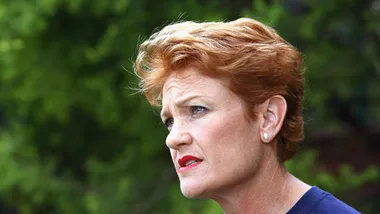Penny Wong says raising her two daughters is the most difficult job she has ever done. Most parents would say that.
But when Penny makes the claim, it forces reflection on the other jobs she has held.
Penny Wong is leader of the Opposition in the Senate and Shadow Minister for Foreign Affairs. If Labor had won the federal election in May, she would have been Foreign Minister at the most difficult time in Australia’s history since the second world war.
Previously, she was Minister for Climate Change and Water in the Rudd government, during the attempt to put a price on carbon and tackle climate change.
To cap that off, she was Minister for Finance during Julia Gillard’s Prime Ministership, trying – unsuccessfully – to deliver a promised surplus after the global financial crisis.
But raising seven-year-old Alexandra and Hannah, four, trumps any of those roles, she says.
Over the past 12 months I have spent hours with Penny, reviewing her life and political career in order to write her biography. One day she was late for one of our interviews.
It was because of a “dispute about fairy wings,” she explains.
“Hannah was determined to wear a shirt with wings attached and it was in the dirty clothes basket and it was filthy and I said, ‘You can’t wear that.'”
“And so I had to look for the fairy wings we got for Christmas, which were somewhere in the back of the cupboard … It’s hard because she is a gentle kid, and if you get angry with her she gets really upset, and it’s …” Penny throws her hands over her face. “It’s, arrrrgh.”
Daughter Alexandra holds baby Hannah in 2015.
(Credit: Twitter)She says her children are “the best thing in my life” – but the hardest thing as well.
“It’s a joyful, moving and humbling experience. But there is nothing in your life where you make so many mistakes so often. And that’s okay. None of us are perfect.”
“You have the care of these kids, not just in a real physical way, but you are trying to foster their spirits and their identity, and give them safety but also joy and stimulation and develop who they are. It’s beautiful and miraculous and it operates at so many levels.”
Penny didn’t welcome the idea of being the subject of a biography. I was researching the book for a year before she reluctantly agreed to a series of interviews.
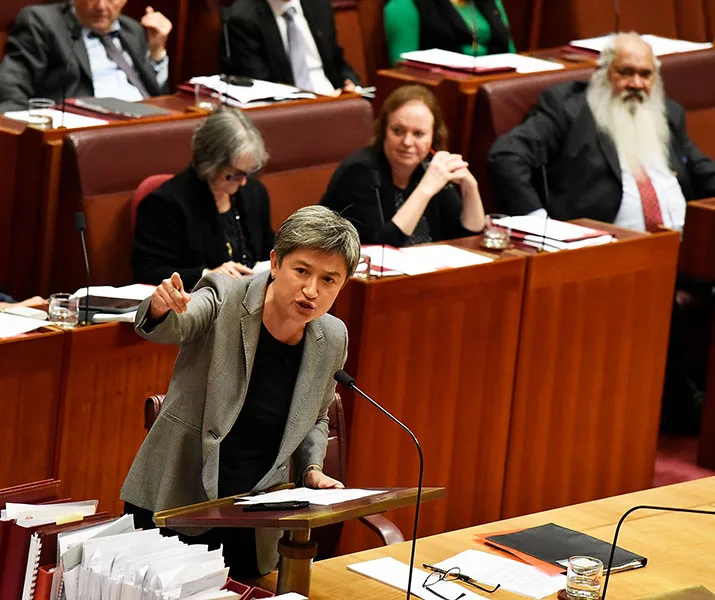
Despite being in public life she is a notoriously private person, known for her intellect and sharp take-downs of political opponents.
(Credit: Getty Images)She has, she acknowledges, a fiercely guarded personal life, which she attributes to having grown up the victim of bullying and racism as a child after she migrated from her birthplace, Malaysian Borneo, to Australia at the age of eight.
Penny’s challenging childhood formed her and her political ambitions. The fear of prejudice – “what it would do to me and my family” – is one of the reasons she gives for not aspiring to be Prime Minister. She judges the country not yet ready for a gay, Asian, female Prime Minister.
Her natural preference is to be a behind-the-scenes worker on policy and politics. She has learned to build a media profile and today has a strong following, particularly among young, left-wing women. But the public facing side of politics is not, she acknowledges, her natural game.
WATCH BELOW: Penny’s stirring speech on marriage equality ahead of the 2017 vote. Story continues after video.
She is fiercely protective of her partner, Adelaide public servant Sophie Allouache, and her children. Already they receive regular abuse on social media. Sophie is the birth mother. The children were conceived using IVF technology. The biological father is known to the women and the girls, but has remained anonymous in public.
This would be challenging enough even for private citizens, but this family also had to deal with the fact that Alexandra was born, on December 11, 2011, just eight days after a fierce national debate, during which the Labor Party changed its policy on the legalising of same-sex marriage from opposed to in favour, but allowing MPs a conscience vote. Penny had been one of the leading voices pushing the change.
Then, four years later, Hannah arrived also at a key time in the same-sex marriage debate, as Labor decided to drop the conscience vote and bind its MPs to voting for change.
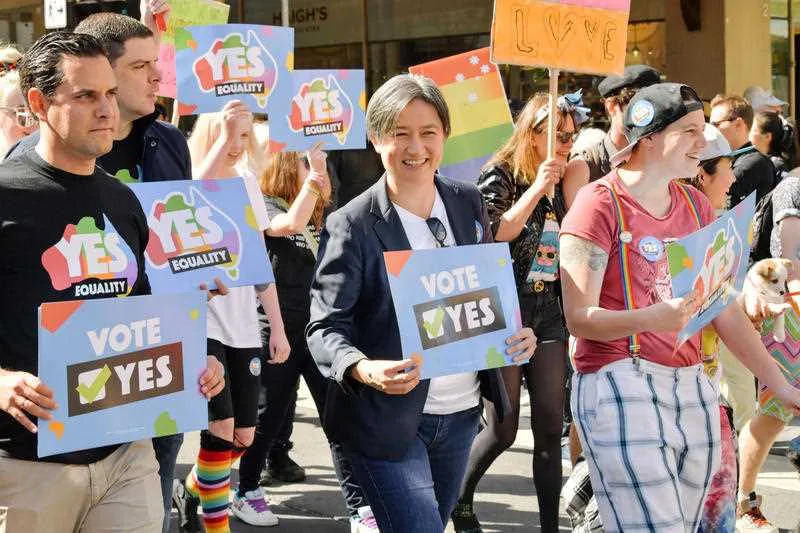
Having suffered from prejudice herself, Penny’s advocacy of legalising same-sex marriage was driven by a determination that her daughters should know themselves to be equal.
When the country was voting in the same-sex marriage plebiscite in late 2017, Sophie and Penny filled out their voting form with the children present. Then they walked together to the postbox and the children dropped their mothers’ votes in.
“For me, this really was wanting them to grow up not ever having society say to them that your family is lesser.”
Few will forget the impact of the result on Penny. She broke down in tears on national television when the result of the vote was announced.
The next day in parliament she wept again, saying, “This is the most personal of debates because it is about the people who matter most to us. It is about the people we love.”
“So I say to Sophie, thank you for your love and commitment and for all you do. And I say to our beautiful daughters, Alexandra and Hannah, I work for and fight for the world I want for you.”
So will she and Sophie marry now that it is legal?
Penny says, “Oh, who knows? That’s something we will discuss together, and not in public.”
It was never about her own desire to marry, she says, it was about her right to do so, and the right of everyone else like her.
Today, Sophie is the primary caregiver for their children. Penny tries to compensate for being so often away by texting the children daily with “lots of emojis”. She also writes them letters and talks to them every day when she is away.
Penny Wong is both a migrant to Australia and, on her mother’s side, a direct descendant of the first white settlers in South Australia. Says Penny: “I always think it’s amusing when people have a go at me, you know, all the racists. And I think, on this side of my family, I go back further than you.”
Her ancestor, Samuel Chapman, arrived in 1836 on board the Cygnet – part of the first fleet of settlers to South Australia. Her father, Francis Wong, is Chinese Malaysian, born in northern Borneo, which was then a British colony but became part of the new country of Malaysia in 1963.
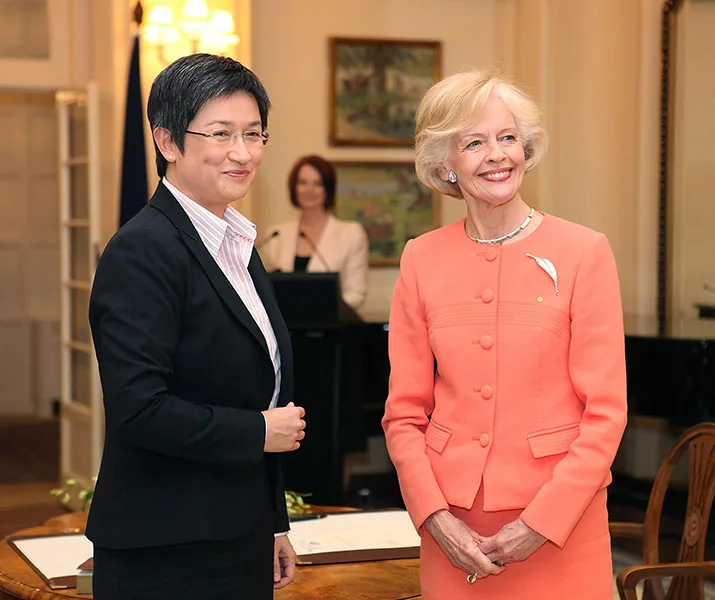
Penny Wong is sworn in as finance minister for the Gillard government by Dame Quentin Bryce, with then Prime Minister Julia Gillard looking on, in September 2010.
(Credit: Getty Images)The family suffered terribly during the Japanese occupation of Borneo in WWII. Penny’s grandmother, Lai Fung Shim, was the only surviving adult in the family, left to try to save five children: Francis, his infant sister Sau Ying and brother Yit Hing, and his siblings by his father’s first wife, half-brother Yet Leun and half-sister Sau Yu. Only the male children survived the war.
In the most desperate of circumstances the two sisters, mere infants, were abandoned by the side of a road. The hope was they could be taken in by another family that could feed them. Penny is reluctant to have this fact printed.
“People will judge. And you can’t judge what happens in that kind of deprivation.”
At different times, the family has searched for them without success. It was only as an adult that Penny realised that she had been named, at her grandmother’s request, after one of those lost daughters. Her full name is Penelope Ying-Yen Wong, after Sau Ying.
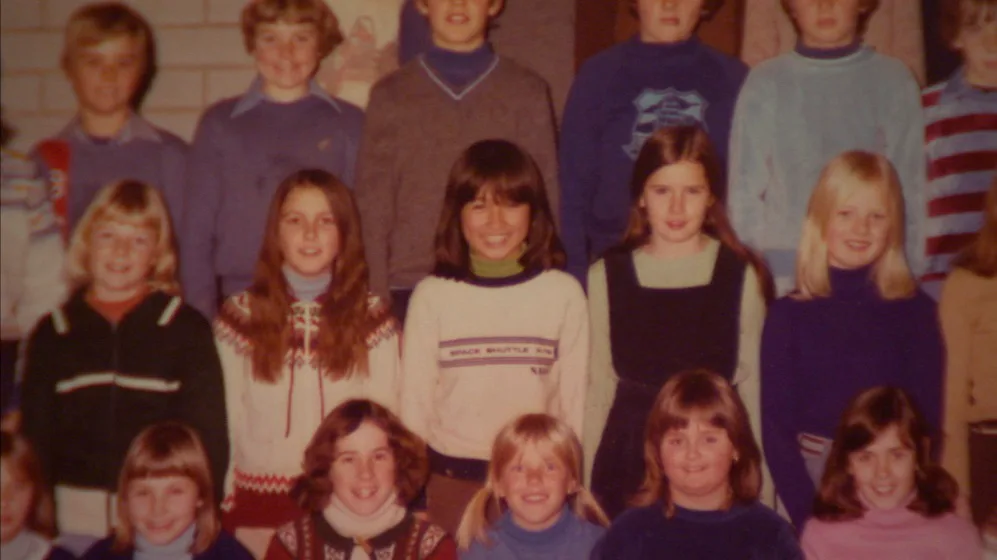
Penny (centre) attended school in the Adelaide Hills and experience racism from a young age.
(Credit: Photo supplied)Francis Wong came to Adelaide as a university student on a scholarship under the Columbo scheme, and met Penny’s mother, Jane Chapman, through mutual friends.
They married and returned to Borneo. Penny was born in Kota Kinabalu in 1968. Her brother, Toby, was born three years later. When the marriage failed, Penny and Toby travelled back to Adelaide with their mother, settling in the Adelaide Hills, where she attended the Coromandel Valley Primary School.
It was 1977 and the wave of Asian immigration that formed part of the legacy of the government of Malcolm Fraser had yet to occur. Penny and Toby were the only Asian children in the schoolyard. They were also abused by a racist neighbour, who called eight-year-old Penny “a slant-eyed s–t”. Racist graffiti was written on their driveway.
The children were constantly bullied at school – and sometimes it turned physical. Penny learned how to fight, but more significantly she developed the tough attitude that has driven her to excel. She was determined to prove herself better than her persecutors.
“I became much more focused on studying, getting good marks, doing well on the sporting field, those sorts of things. I decided I was going to be better than them, and achieve in this field, and this field, and this field.”
“I was trying to prove that I could succeed no matter what they said to me, and no matter what they thought of me … I didn’t become insular. I’ve seen that happen with kids, but that wasn’t my response.
“I just pretended to be confident, even when I wasn’t. I learned to be steady and still, even when it felt very messy and difficult. You know, to hold yourself steady, even if your reactions are really strong and your emotions confused.”
Toby was less resilient. He grew up to be a talented chef and a musician, well known in the restaurant scene in Adelaide and Melbourne. But he was permanently marked by the racism he and Penny faced.
His memory is one of the reasons Penny remains furious with former Prime Minister John Howard making a political issue out of Asian immigration and failing to condemn Pauline Hanson when she attacked Asians in her maiden speech.
Sometime during the Howard years, Toby, by then in his mid-teens, failed to come home from school as expected. Jane and Penny were frantic as the hours ticked by.
Eventually he arrived, footsore and weeping. A group of young men had got on the bus and abused him for being Asian. The bus driver had stopped and made Toby get off.
“I remember thinking that this is what Howard was doing,” says Penny. “He was talking to those people. Those racists, that bus driver.”
In one of the great tragedies of her life, Toby died by suicide 10 days after his 30th birthday, which was also the day on which Penny was elected to the Senate in 2001. She paid tribute to him in her first speech in parliament, which she used to attack Howard’s politicisation of race and to declare “compassion”, particularly for the marginalised, as her guiding principle in politics.
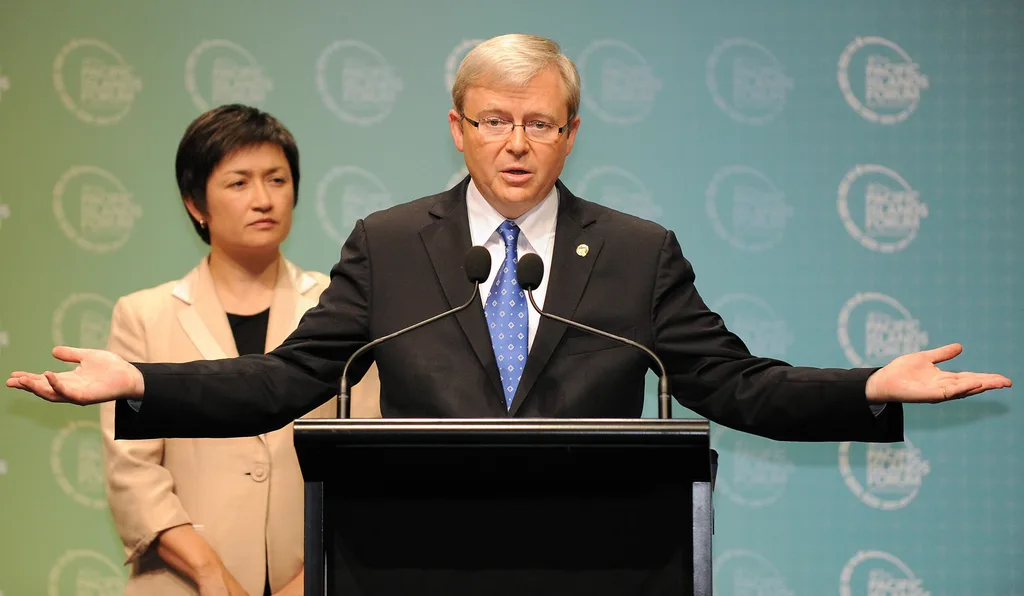
Penny serves as Minister for Climate Change under the initial Rudd Government. She attended the 40th Pacific Islands Forum (PIF) summit in Cairns 2009 alongside the then-Prime Minister.
(Credit: Getty Images)“Compassion is what underscores our relationships with one another, and it is compassion which enables us to come to a place of community even in our diversity,” she said.
Toby’s life and death, she said, would “ensure that I shall never forget what it is like for those who are truly marginalised.”
Penny, herself an accomplished cook, still makes a dish she calls “Toby’s fish”, partly in memory of her brother. The recipe is in the book.
Now Penny is dealing with Labor’s surprise defeat in the last federal election. She admits she considered quitting politics for a few days after the result.
The morning after the vote, when Alexandra and Hannah woke up, they saw Penny’s face. “Did you lose, Mum?” asked Alexandra. “How are you?”
“Devastated. Very, very upset.”
The children set about trying to work out what they could do. Penny recalls: “They made me a coffee and they gave me their last gingerbread man. I thought, greater love hath no child …”
In the weeks leading up to the election, Alexandra had told her mother she didn’t want Labor to win, because it would mean Penny would be away from home more often. The job of foreign minister involves near constant travel.
But now Alexandra felt guilty about her earlier comment. “She said, ‘Mum, I know I said I didn’t want you to win, but I did want you to win as well.’ I said, ‘It’s okay, darling. That’s just how it happened’,” Penny says.
In the end, though, Penny rallied, deciding that her lifelong commitment to, as she puts it, living a life with meaning and trying to make a difference, should carry her through. And one of the great benefits of the defeat is that she is home more often for the children.
In recent years, Penny has been back to Coromandel Valley Primary School as an honoured guest. It is a very different place – the population of the playground reflects Australia’s ethnic diversity, and the school values of tolerance and inclusion are constantly reinforced.
Her visit was, she says, “very healing”. Meanwhile, in the months before the last election, she gave a speech on foreign policy arguing for Australia to be more assertive in the region – neither slavishly following the US nor failing to stand up to China on issues of sovereignty.
“Our foreign policy should be driven by our values,” she said. She referred to her maiden speech and her description of compassion as a core value. She said she hadn’t changed her mind.
Penny Wong: Passion and Principle by Margaret Simons, $34.99, is published by Black Inc.
Read more on Penny’s personal and political life in the November issue of The Australian Women’s Weekly, on sale now.
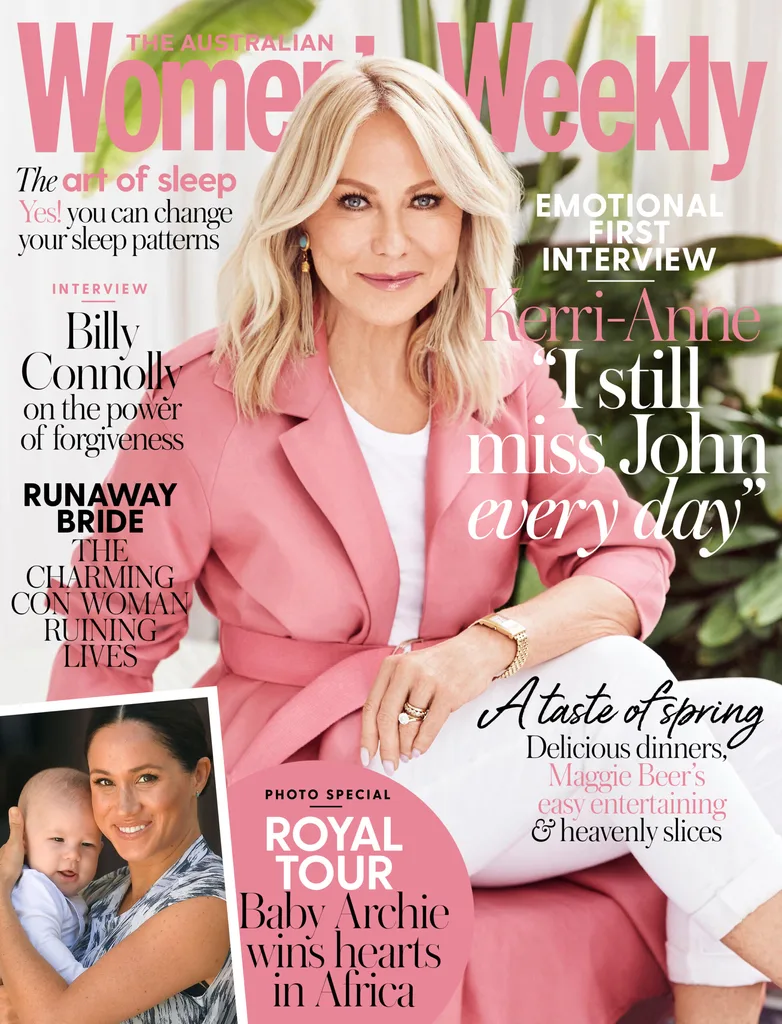
The November issue of The Australian Women’s Weekly is on sale now.
(Credit: AWW)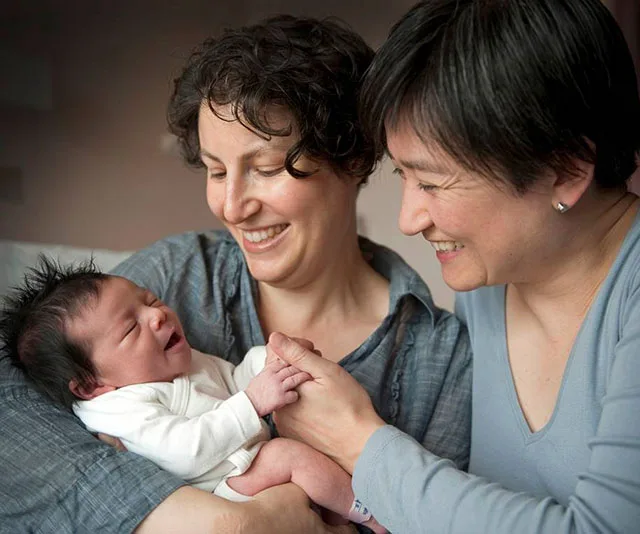
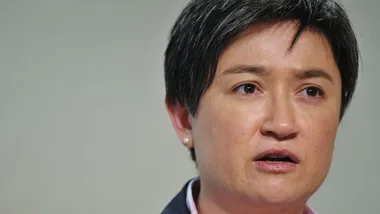
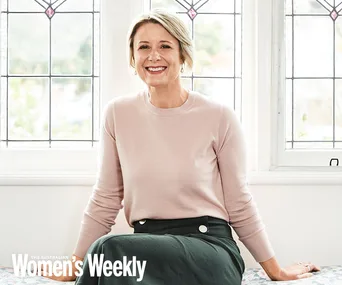
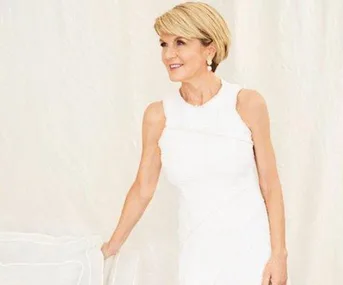

.png?resize=380%2C285)
